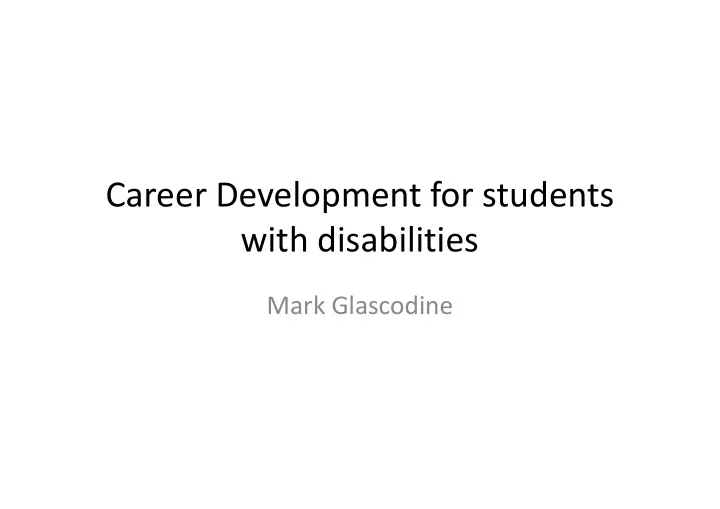

Career Development for students with disabilities Mark Glascodine
Agenda • Introduction of Mark • How society views people with disabilities – Media view – Government view – Facts and therefore the truth • Key ingredients to career success • Key ingredients to successful career transition • Tools • Options for Successful Transitions
Eternal Child http://www.smh.com.au/articles/2007/10/19/1192301045447.html Some cultures throughout history have viewed people with an intellectual disability and often those with a mental illness aS child like. 3
The brave hero http://www.findingdulcinea.com/features/sports/olympians/The-Paralympics.html The media in particular often presents stories of people with a disability overcoming enormous barriers to achieve their life goals. 4
The diseased or possessed http://aids.gov/hiv-aids-basics/hiv-aids-101/overview/myths / There are cultural beliefs around disability that view the person with a disability as diseased or even possessed. There is an element of fear, sometimes of catching the disability. 5
The charity and pity http://www.starlight.org.au/InspirationalStories/Pages/ShareYourStory.aspx Even in our recent history people with a disability have relied on charity to survive. 6
Deviant or Freak http://616to915.blogspot.com/2009/09/crazy-cat-lady-fails-at-blogging.html http://www.consortiuminfo.org/standardsblog/article.php?story=200810110 64913511 A very common perception that evokes fear and curiosity is the person that looks different or acts differently 7
Exercise - Take some time to think about these perspectives. Talk about examples that you have seen in the media in your group. Why are they not helpful? How do they create barriers for people with a disability? What would have been a better way to present the person with a disability? This is a good opportunity to review your own motivation where are you coming from? http://www.creaturediscomforts.org/play/?v=8 8
Part 2 The Australian Institute of Health and Welfare predicts that, on average, men in Australia as they age can expect to live nearly 19 years of their lives with a disability (and more than 5 years with a "severe or profound" disability) while women, living longer, can expect to experience nearly 21 years of disability and over 8 years of severe or profound disability. 9
What is happening in Australia now? ABS indicators 2003 Australian Bureau of Statistics (ABS) Survey of Disability, ageing and Carers (SDAC) Completed year 12 49% 30% Labour Force Participation 81% 53% and 15% (profound/severe Disability) Median gross income per $501 $255 and 200 (profound/severe Disability) week 10
11
Medical model of disability Sourced from: Participant Handbook CHCCS102 Certificate 1 Work Preparation
Social model of disability Sourced from: Participant Handbook CHCCS102 Certificate 1 Work Preparation
Key ingredients to career success “Countries in the OECD and the European Union are implementing • lifelong learning strategies, as well as policies to encourage the development of their citizens’ employability. To be successfully implemented, such strategies and policies require citizens to have the skills to manage their own education and employment.” (OECD Policy Handbook, 2010). These are career management skills, which everyone needs and is entitled to have. “Less than half of earnings variation in OECD countries can be • accounted for by educational qualifications and readily measurable skills. It is argued that a significant part of the remainder may be explained by people’s ability to build, and to manage, their skills.” (OECD, Bridging the Gap, 2005). These career management skills give the individual power to choose and lead to a motivated performer at work.
Key ingredients to successful career transition • Keys skills to be explored and developed before 18 years old, if not before 10 years old are – Decision making skills – Resilience • Career development – Career awareness – Career exploration – Career management – An example is the Victorian Careers Curriculum Framework (talked about later)
Key ingredients to successful career transition • Successful transition – Halpern (1985) • Contains 3 possible parts – Engagement in employment, ongoing learning &/or training – Living in and participating in your local community in a way similar to same age peers – Having active social networks with family and friends
Key ingredients to successful career transition • All important people around the student including school, parents and community • Believing every students can get employment – Whether they choose to or not • Believers – Paula Barnett – Principal Berendale, Melbourne – Richard Lueking – USA , transcen.com
Tools • Schools – Person Centred – VCCF (Year 7-12) – VET/VCAL – Work experience/placement • Ticket to work (SBAT) • Beyond the school gates • Parents – PACTS – EPPICS All being talked about today
Options for Successful Transitions DES Open Employment - Generalist - Specialist Community Networks Ticket to RTO Social work TAFE Inclusion Community ADE Successful Agencies Transition School Community House Services Work Individualised services Placement Daycentre Student Journey
Recommend
More recommend